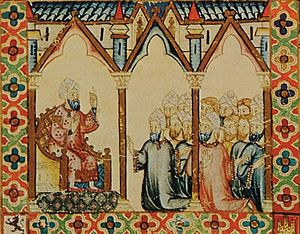Ibn Hud facts for kids
Quick facts for kids Ibn Hudمحمد بن يوسف بن هود |
|||||
|---|---|---|---|---|---|

A picture from the 13th century showing Ibn Hud meeting people. It's from the Cantigas de Santa Maria book.
|
|||||
| Reign | 1228-1238 | ||||
| Died | 1238 Almería |
||||
| Burial | Murcia | ||||
|
|||||
| Clan | Banu Hud (claimed) | ||||
| Religion | Sunni Islam | ||||
Abū ’Abd Allāh Muḥammad ibn Yūsuf ibn Hūd al-Judhamī, known as Ibn Hud, was an important ruler in al-Andalus. Al-Andalus was the name for the parts of Spain and Portugal ruled by Muslims long ago. Ibn Hud controlled much of this area from 1228 to 1237. He said he was related to the Banu Hud family, who used to rule the city of Zaragoza.
Contents
Rise to Power in Al-Andalus
After a big battle called the Battle of Las Navas de Tolosa in 1212, the Almohad empire started to lose its power in al-Andalus. The Almohads were a powerful Muslim group that ruled a large area.
In May 1228, Ibn Hud started a rebellion. Many people supported him quickly. He defeated the local governors in cities like Murcia and Valencia. At the same time, the Almohad leader, Idris al-Ma'mun, had to leave Seville. He took his soldiers to fight a rival in Marrakesh. This made it easier for Ibn Hud to take control of most of al-Andalus. Only Valencia resisted him for a while, led by Zayyan ibn Mardanish.
Seeking Legitimacy and Challenges
To make his rule stronger and more accepted, Ibn Hud promised loyalty to the Abbasid Caliphate. The Abbasid Caliphate was a very old and respected Islamic empire based in Baghdad. Ibn Hud also took special titles, like Amir al-Mu'minin (Commander of the Faithful) and al-Mutawwakil (He who relies on God).
However, Ibn Hud faced many challenges. In 1231, his army lost badly to the Kingdom of Castile in the Battle of Jerez. He also lost to the Kingdom of León near Mérida. These defeats made him lose support from some people. They even gave him the nickname 'the Deprived'.
Losing Control and Final Days
In 1232, a new leader named Muhammad I of Granada declared himself sultan in the region of Jaén. He quickly became Ibn Hud's main rival. This forced Ibn Hud to make a peace agreement with the Christian Kingdom of Castile.
Even though Ibn Hud managed to defeat Ibn Nasr in 1234, he couldn't protect all his lands. In 1236, Ferdinand III of Castile captured the important city of Córdoba. After this, Ibn Hud had to sign another peace agreement with both Ferdinand III and Ibn Nasr.
In 1237, the city of Granada accepted Ibn Nasr as its ruler. Ibn Hud's power was fading. He was killed in January 1238 near the city of Almería. He was buried in Murcia.
See also
 In Spanish: Ibn Hud para niños
In Spanish: Ibn Hud para niños
 | Audre Lorde |
 | John Berry Meachum |
 | Ferdinand Lee Barnett |

